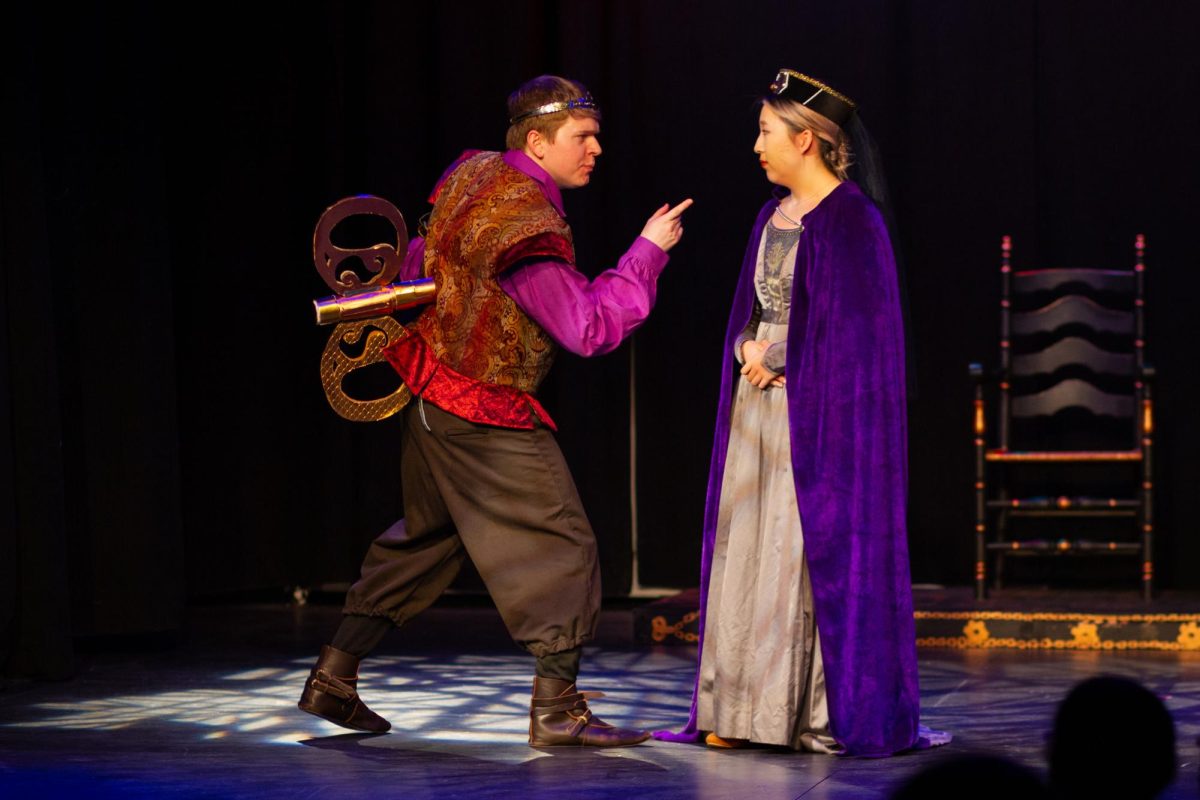“Now is the winter of our discontent.” The very first line of Richard III hits a little too close to home for UChicago students in the middle of winter quarter. And it is not the only somber truth in the play. The focus of Richard III, the scar left by tyranny, is ubiquitous: familiar to many students in their Social Sciences and Civilizations sequences and pervasive in the news. On February 15–17, it was keenly felt on the 3rd floor of the Reynolds Club. With an automaton, bloodshed, and humor, the Dean’s Men’s production of Richard III warned of the human consequences of tyranny.
Humanity is typically not the first thing that comes to mind when Richard III is mentioned. Richard of Gloucester, the play’s protagonist, is arguably one of Shakespeare’s greatest villains: he quests incessantly for power, and if you’re measuring villains by kill count, he comes in first.
Humanizing this unrelenting evil is a challenge that every production of Richard III must respond to, but it is not the only one. “Deformed, unfinish’d, sent before my time… That dogs bark at me as I halt by them” is how Richard describes his characteristic physical disability, often portrayed as a hunchback, in the opening soliloquy of the play. Recent productions have found themselves confronting the ethics of how to portray this. In 2022, the Royal Shakespeare Company cast a disabled actor as Richard for the first time, while the Public Theater chose to leave Richard’s disability out entirely.
In this production, co-directors Nora Schultz and Honor Torrance have come up with their own answer, simultaneously addressing both predicaments of humanizing evil and approaching disability: Richard is a power-hungry automaton.
As this machine rises toward kingship in 15th-century England, killing anyone who stands in his way, he is not hindered by his conscience—or by the enormous, shiny winder attached to his back. Even if you were to miss this distinctive costume piece or the notable design choices (such as the ticking sound effect that creeps up during tense moments or the mechanical, unsettling music box melody), there would be no confusion surrounding the duke’s robotics. Jack Pflieger’s performance as Richard is careful and calculated, mechanical in his laughter and physicality, yet smooth and kingly in his speech. In short, it’s everything you’d want to see in an evil robot.
Pflieger’s savvy approach to mechanization sets the stage for the rest of the cast to emphasize their humanity, and they rise well to the occasion. In the second scene, Griffin Jones shows skillful range as Queen Anne, moving from spitting in Richard’s face to accepting a ring from him in marriage. It is a difficult transition to pull off, but Jones does so candidly, foreshadowing the devastating consequences of Richard’s expert manipulation.
It can be nail-biting to watch this evil unfold, as Richard includes the audience in every step along the way through natural and polished soliloquies. This makes it easy to become invested: there is a jarring tension between knowing what’s going to occur and watching it happen that speaks poignantly to tyranny’s ability to masquerade itself. Moments like Queen Margaret’s unheeded warning cries are especially gut-punching, delivered intensely by Anya Moseke with desperate urgency to unlistening (or perhaps unwilling) ears. Frustrating as it is, the irony she captures is a solemn reminder that tyranny doesn’t look like tyranny to most. Indeed, if Richard III is meant to serve as a warning of tyranny, this production’s greatest strength is its ability to communicate this warning subtly and emotionally.
For instance, this theme is well-aided by technical choices. An empty throne sits threateningly upstage and remains lit as a warning for nearly the entire duration of the play. The sound design (Kelly Mao), which features classical music, is particularly effective at reflecting the fear and danger of Richard’s coercion, ranging from violent and intense violin to a chilling piano underscore.
In Richard’s murders, the consequences are intimately felt. In an emotional and fevered monologue shortly before being killed, Clarence (Ruth Witter) recounts a nightmare about going to hell, and the panic is tangible. When the murderers approach, the audience, like Clarence, feels trapped. Later in the play, after two of her sons are killed, Queen Elizabeth’s (Fimi Adesemoye) performance is emotional and potent—“I have no more sons of the royal blood / For thee to murder.”
Despite all the bloodshed, there are resilient moments of comedy—another strength of the production is its ability to contrast tragedy with humor. The genial Buckingham (Simon Lenoe) epitomizes this strength: through excellent timing and natural delivery, he is relatable and funny; an excellent foil to Richard that makes the Duke’s eventual (and inevitable) betrayal hard-hitting.
The humor does not detract from the seriousness of the play, but rather makes the production more engaging. In Clarence’s murder scene, the assassins (Charlie Robinson and Tannus Vollmer) are hilarious and effective in their timing and physical comedy. Queen Elizabeth’s two sons have a distinctly humorous relationship, with actors Moseke and Witter committing well to their characters’ quirks. Even the play’s final speech, delivered by the victorious Richmond (Charlie Robinson) after Richard is slain, is full of comedic awkwardness and adolescence.
In the end, Richard’s defeat does not leave much hope. The human consequences of tyranny have been felt, and we are reminded of the emotional (and physical) baggage when the victims appear as sobering ghosts haunting Richard’s conscience. Even this last fleeting ability to demonstrate a conscience—fully establishing Pflieger’s remarkable range—does not provide solace. If anything, it drives the essence of the play home: no one, not the tyrant, not his victims, not the audience, is spared from the devastation of tyranny.









